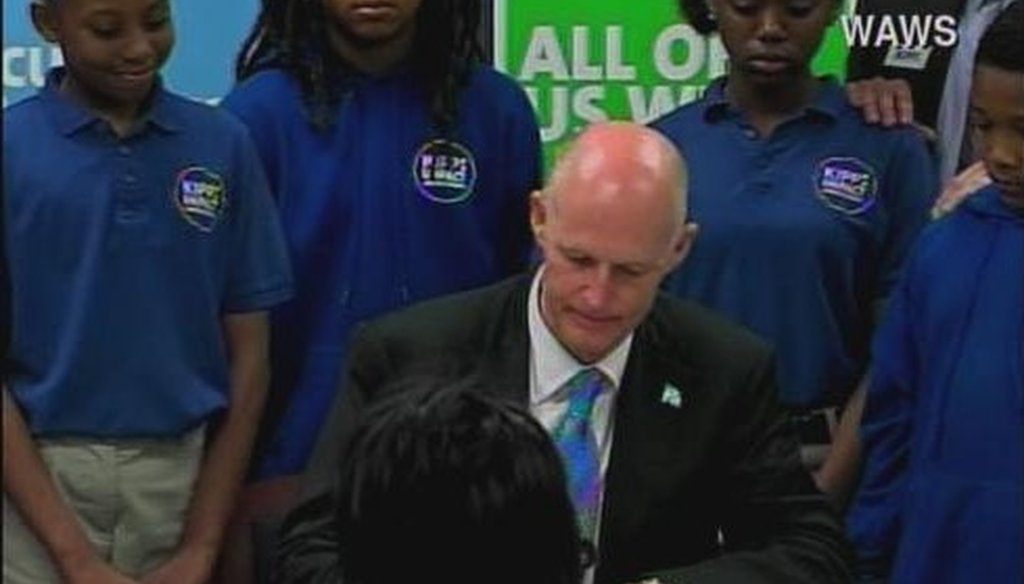Stand up for the facts!
Our only agenda is to publish the truth so you can be an informed participant in democracy.
We need your help.
I would like to contribute

Gov. Rick Scott signs SB 736 on March 24, 2011. Photo courtesy of WPLG.
Change is coming to how Florida teachers will be evaluated and compensated, courtesy of the Florida Legislature and Gov. Rick Scott.
Scott signed his first bill into law on March 24, 2011, SB 736 or the "Student Success Act." The law would tie teachers' raises for the first time to how their students perform in the classroom. It's similar but not as stringent as a bill passed by the Legislature but vetoed by Gov. Charlie Crist during the 2010 legislative session.
"I am proud that the first bill I sign is this important legislation that will give Florida the best educated workforce to compete in the 21st century economy," Scott said in a press release. "We must recruit and retain the best people to make sure every classroom in Florida has a highly effective teacher."
The passage and signing of the bill -- which was opposed by many teachers -- fulfills two Scott campaign promises on the Scott-O-Meter.
Scott pledged to pay teachers based on student performance, and SB 736 does just that. We rated it a Promise Kept.
Under the law, current teachers would have the option of keeping their current standard salary schedule or would be able to opt into the new "performance" play plan. All new teachers would be forced into the performance system. Starting in 2014, teachers under the performance plan would be rated "highly effective," "effective," "needs improvement" or "unsatisfactory." Three years of student test scores would make up 50 percent of the rating, which would then correspond to a raise -- or not.
Teachers who rate "highly effective" would receive the biggest raises, and teachers who rate "needs improvement" or "unsatisfactory" would receive no raise at all.
The bill also prohibits schools from setting different salary schedules for teachers with advanced degrees, unless the advanced degree is in the teacher's area of certification. And it requires school districts to offer salary supplements for educators teaching in under-performing schools and in critical teacher-shortage areas.
The law, as Scott pledged, also eliminates multi-year contracts, sometimes called "tenure" for new teachers. Another Promise Kept.
SB 736 says that teachers hired after July 1, 2011, would first be hired on a one-year probationary contract and that during that year, they could be fired without cause. Teachers, if they meet other requirements, would then be offered contracts one year at a time.
However, the law does not entirely meet a third campaign promise, to include the use of technology in teacher evaluations.We rated that promise a Compromise.
The law as it's written does not specifically address the use of technology.
An earlier version of SB 736 did, but that language was stricken from the final bill that passed and was signed into law. The technology language was replaced by a broader requirement that evaluation criteria be based on the Florida Educator Accomplished Practices, which are six general standards adopted by the State Board of Education.
Those general standards include some discussion of technology, though not as explicitly as in the original version of the bill.
We also moved another education promise to In the Works. Scott promised to expand school options for parents, and two different voucher proposals are now being considered in the Legislature. One, SB 1550 , is being pushed in the Senate by Sen. Joe Negron, R-Stuart, and in the House by Rep. Jeff Brandes, R-St. Petersburg, and would create an "education savings account" for parents -- essentially allowing them to choose whether to pay for enrollment in a public or private school.
A second less-dramatic proposal being sponsored by Rep. Michael Bileca, R-West Miami, would broaden the definition of a struggling school and allow more students into the state's current voucher system.
So that's one bill signed into law -- two Promises Kept and one Compromise. And a fourth promise In the Works. Not a bad start for Scott.
Our Sources
See individual items.






























